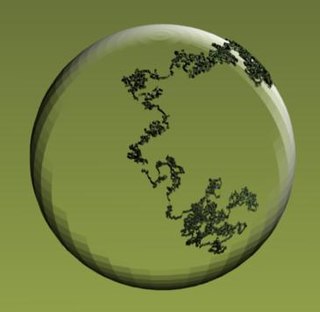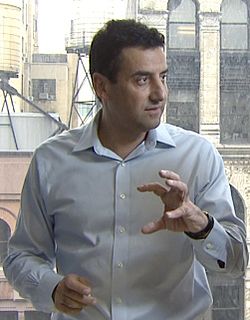
In probability theory and related fields, a stochastic or random process is a mathematical object usually defined as a family of random variables. Stochastic processes are widely used as mathematical models of systems and phenomena that appear to vary in a random manner. Examples include the growth of a bacterial population, an electrical current fluctuating due to thermal noise, or the movement of a gas molecule. Stochastic processes have applications in many disciplines such as biology, chemistry, ecology, neuroscience, physics, image processing, signal processing, control theory, information theory, computer science, cryptography and telecommunications. Furthermore, seemingly random changes in financial markets have motivated the extensive use of stochastic processes in finance.
Stochastic refers to the property of being well described by a random probability distribution. Although stochasticity and randomness are distinct in that the former refers to a modeling approach and the latter refers to phenomena themselves, these two terms are often used synonymously. Furthermore, in probability theory, the formal concept of a stochastic process is also referred to as a random process.

Mathematical statistics is the application of probability theory, a branch of mathematics, to statistics, as opposed to techniques for collecting statistical data. Specific mathematical techniques which are used for this include mathematical analysis, linear algebra, stochastic analysis, differential equations, and measure theory.

Mathematics encompasses a growing variety and depth of subjects over its history, and comprehension of it requires a system to categorize and organize these various subjects into more general areas of mathematics. A number of different classification schemes have arisen, and though they share some similarities, there are differences due in part to the different purposes they serve.
The Institute of Mathematical Statistics is an international professional and scholarly society devoted to the development, dissemination, and application of statistics and probability. The Institute currently has about 4,000 members in all parts of the world. Beginning in 2005, the institute started offering joint membership with the Bernoulli Society for Mathematical Statistics and Probability as well as with the International Statistical Institute. The Institute was founded in 1935 with Harry C. Carver and Henry L. Rietz as its two most important supporters. The institute publishes a variety of journals, and holds several international conference every year.

Michel Pierre Talagrand is a French mathematician. Docteur ès sciences since 1977, he has been, since 1985, Directeur de Recherches at CNRS and a member of the Functional Analysis Team of the Institut de Mathématique of Paris. Talagrand was elected as correspondent of the Académie des sciences of Paris in March 1997, and then as a full member in November 2004, in the Mathematics section.
Lajos Takács was a Hungarian mathematician, known for his contributions to probability theory and in particular, queueing theory. He wrote over two hundred scientific papers and six books.
Bálint Tόth is a Hungarian mathematician whose work concerns probability theory, stochastic process and probabilistic aspects of mathematical physics. He obtained PhD in 1988 from the Hungarian Academy of Sciences, worked as senior researcher at the Institute of Mathematics of the HAS and as professor of mathematics at TU Budapest. He holds the Chair of Probability at the University of Bristol and is a research professor at the Alfréd Rényi Institute of Mathematics, Budapest.

Moshe Zakai was a Distinguished Professor at the Technion, Israel in electrical engineering, member of the Israel Academy of Sciences and Humanities and Rothschild Prize winner.

In mathematics, stochastic geometry is the study of random spatial patterns. At the heart of the subject lies the study of random point patterns. This leads to the theory of spatial point processes, hence notions of Palm conditioning, which extend to the more abstract setting of random measures.

Sir Martin Hairer is an Austrian-British mathematician working in the field of stochastic analysis, in particular stochastic partial differential equations. He is Professor of Mathematics at Imperial College London, having previously held appointments at the University of Warwick and the Courant Institute of New York University. In 2014 he was awarded the Fields Medal, one of the highest honours a mathematician can achieve. In 2020 he won the 2021 Breakthrough Prize in Mathematics.
The following outline is provided as an overview of and topical guide to formal science:
In queueing theory, a discipline within the mathematical theory of probability, a fluid queue is a mathematical model used to describe the fluid level in a reservoir subject to randomly determined periods of filling and emptying. The term dam theory was used in earlier literature for these models. The model has been used to approximate discrete models, model the spread of wildfires, in ruin theory and to model high speed data networks. The model applies the leaky bucket algorithm to a stochastic source.

Cyrus Derman was an American mathematician and amateur musician who did research in Markov decision process, stochastic processes, operations research, statistics and a variety of other fields.

Gérard Ben Arous is a French mathematician, specializing in stochastic analysis and its applications to mathematical physics. He served as the director of the Courant Institute of Mathematical Sciences at New York University from 2011 to 2016.

Stanislav Alexeyevich Molchanov is a Soviet and American mathematician.










